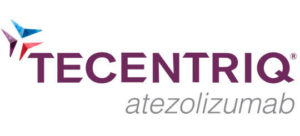Liver cancer (hepatocellular carcinoma)
Tecentriq® (atezolizumab) in combination with bevacizumab
What is hepatocellular carcinoma?
Hepatocellular carcinoma (HCC) is the most common type of liver cancer that starts in the main type of liver cell, called a hepatocyte.
HCC usually arises in people who have had underlying liver disease for many years resulting in liver scarring (cirrhosis). In New Zealand, the most common causes of the underlying liver disease are hepatitis B, hepatitis C, alcohol, obesity and diabetes.
HCC treatment options
Some cases of HCC can be removed with surgery. If the HCC cannot be removed with surgery (unresectable), it may be treated with medicines including Tecentriq and bevacizumab.
Tecentriq
Pronounced Tee-sen-trick
How Tecentriq works

Tecentriq belongs to a group of medicines called immunotherapies, which work with your body’s own immune system to fight cancer cells. Tecentriq is not the same as chemotherapy.
Tecentriq works by attaching to a protein in your body, called PD-L1, which is found on some tumour cells. When this happens Tecentriq helps the immune system to better identify the cancer cells and kill them.
How bevacizumab works
Bevacizumab works by blocking an important growth factor called vascular endothelial growth factor or VEGF. This disrupts blood flow to the cancer, restricting the supply of nutrients that it needs to grow and spread.
Because Tecentriq and bevacizumab work in different ways, the two medicines complement each other when they are used together to treat HCC.

How Tecentriq and bevacizumab are administered
Tecentriq, together with bevacizumab, is given by a drip or intravenous infusion that your doctor or nurse inserts into a vein. The number of infusions you will be given depends on how you respond to treatment. Your doctor will keep giving you Tecentriq and bevacizumab until you no longer benefit from it. However, they may be stopped if the side effects become too much of a problem.
Clinical Trial Data
A clinical study comparing the safety and effectiveness of Tecentriq + bevacizumab with that of another medicine called sorafenib included 501 patients with advanced HCC or tumors that could not be removed by surgery. Tecentriq + bevacizumab was found to be more effective in treating HCC than sorafenib.
Keep in mind that everyone is different, and the response and benefit you may experience cannot be predicted. Ask your doctor about the clinical evidence for Tecentriq and bevacizumab and if the combination is right for you.
Possible side effects of Tecentriq + bevacizumab
All medicines can have side effects. You will find a list of known side effects in the Tecentriq Consumer Medicine Information available via links below.
Talk to your doctor to see if Tecentriq and bevacizumab are right for you.
How to access Tecentriq and bevacizumab
Tecentriq and bevacizumab are funded by PHARMAC for patients with unresectable HCC who meet pre-defined criteria. Ask your doctor for more information.
Ready to take the next step?
Because every situation is different, it’s important to speak to your medical team to find out if Tecentriq and bevacizumab are right for you.
We’ve put together a discussion guide to help you begin a conversation with your doctor. Print it off, take it along to your next appointment, and take notes in the spaces provided.
Talking to your doctor about Tecentriq and bevacizumab
To help you in this process, we’ve put together a discussion guide to help you begin a conversation with your doctor. Print it off, take it along to your next appointment, and take notes in the spaces provided.
Handy resources
These resources contain important safety and side effect information. Please keep in mind that these are not intended to replace medical advice from a doctor or other healthcare professionals.
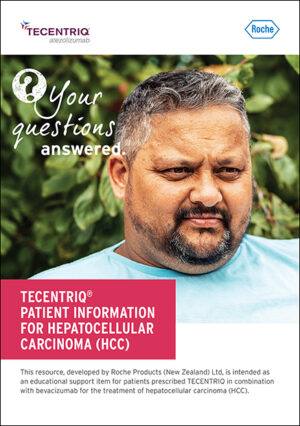
Tecentriq for HCC patient resource
This resource is intended as an educational support item for patients prescribed TECENTRIQ in combination with bevacizumab for the treatment of HCC.
DOWNLOAD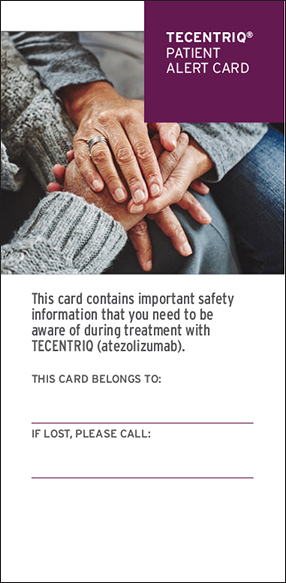
Tecentriq patient alert card
This card contains important safety information that you need to be aware of during treatment with TECENTRIQ. Show this card to all the healthcare professionals you visit.
DOWNLOAD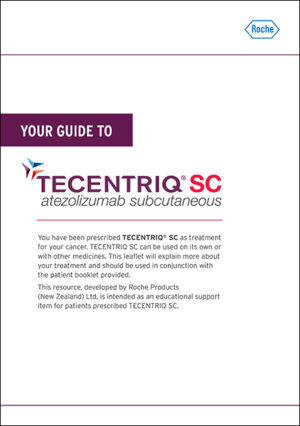
Tecentriq SC patient insert
This leaflet is for patients being administered Tecentriq by subcutaneous injection and should be used in conjunction with the Tecentriq for HCC patient resource.
DOWNLOAD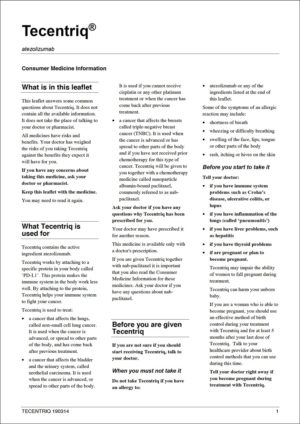
Tecentriq Consumer Medicine Information
DOWNLOADFurther information
For more information about liver cancer you can visit the Gut Cancer Foundation
You can also find information at the Hepatitis Foundation of New Zealand
